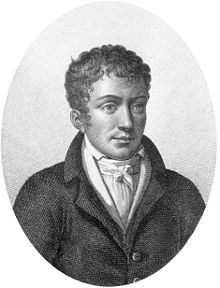Pierre Cabanis
| Pierre Jean Georges Cabanis | |
|---|---|

Pierre Jean Georges Cabanis
|
|
| Born |
5 June 1757 Cosnac, Corrèze |
| Died | 5 May 1808 (aged 50) Seraincourt, Val-d'Oise |
| Nationality | French |
| Scientific career | |
| Fields | Physiology |
Pierre Jean Georges Cabanis (French: [kabanis]; 5 June 1757 – 5 May 1808) was a French physiologist, freemason and materialist philosopher.
Cabanis was born at Cosnac (Corrèze), the son of Jean Baptiste Cabanis (1723–1786), a lawyer and agronomist. At the age of ten, he attended the college of Brives, where he showed great aptitude for study, but his independence of spirit was so great that he was almost constantly in a state of rebellion against his teachers and was finally expelled. He was then taken to Paris by his father and left to carry on his studies at his own discretion for two years. From 1773 to 1775 he travelled in Poland and Germany, and on his return to Paris he devoted himself mainly to poetry. About this time he sent to the Académie française a translation of the passage from Homer proposed for their prize, and, though he did not win, he received so much encouragement from his friends that he contemplated translating the whole of the Iliad.
At his father's wish, he gave up writing and decided to engage in a more settled profession, selecting medicine. In 1789 his Observations sur les hôpitaux (Observations on hospitals, 1790) procured him an appointment as administrator of hospitals in Paris, and in 1795 he became professor of hygiene at the medical school of Paris, a post which he exchanged for the chair of legal medicine and the history of medicine in 1799.
Partly because of his poor health, he tended not to practise as a physician, his interests lying in the deeper problems of medical and physiological science. During the last two years of Honoré Mirabeau's life, Cabanis was intimately connected with him, and wrote the four papers on public education which were found among the Mirabeau's papers at his death, and were edited by the real author soon afterwards in 1791. During the illness which terminated his life Mirabeau trusted entirely to Cabanis' professional skills. Of the death of Mirabeau, Cabanis drew up a detailed narrative, intended as a justification of his treatment of the case. He was enthusiastic about the French Revolution and became a member of the Council of Five Hundred and then of the conservative senate, and the dissolution of the Directory was the result of a motion which he made to that effect. His political career was brief. Hostile to the policy of Napoleon Bonaparte, he rejected every offer of a place under his government. He died at Meulan.
...
Wikipedia
